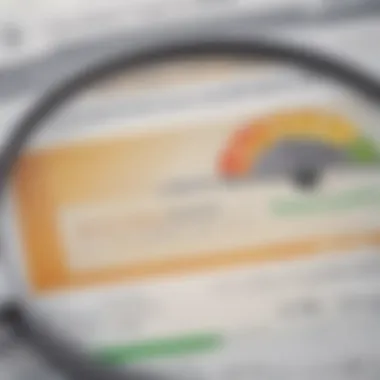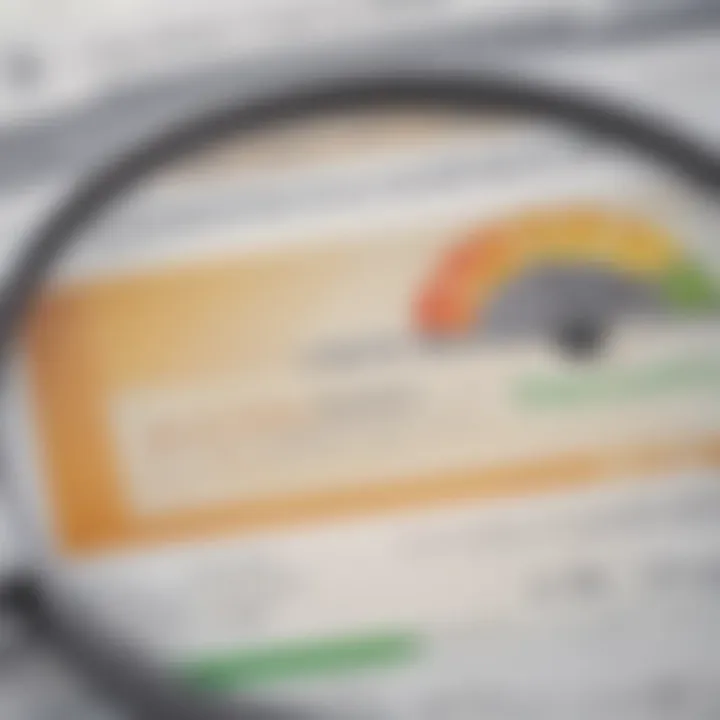Buying a Home with Poor Credit: Your Options


Intro
Buying a house is often seen as the ultimate American dream, a symbol of stability and success. However, for many, particularly those with low credit scores, this dream feels more like a distant fantasy. It’s easy to assume that a poor credit rating automatically disqualifies someone from obtaining a mortgage, but that's not always the case. As challenging as it may be, individuals with bad credit can still find paths to homeownership. This article delves into the intricacies of this topic, shedding light on the implications of low credit scores, alternate financing routes, and tangible steps for credit improvement.
Navigating the murky waters of the housing market with bad credit requires not just resilience but also a deep understanding of financial concepts and market trends. Often, traditional lenders are reluctant to work with those who’ve had financial missteps, but there are other avenues worth exploring. Understanding alternatives can empower potential buyers facing these hurdles, turning obstacles into opportunities.
Understanding Credit Scores
In the landscape of home buying, credit scores serve as a crucial metric influencing not just the ability to secure a mortgage, but also the terms and conditions that come along with it. When someone stumbles upon the question of purchasing a house with less-than-stellar credit, it becomes increasingly essential to understand how these scores work. Knowledge here isn't just power; it can be the difference between homeownership and being sidelined.
A clear grasp of credit scores helps individuals identify where they stand and informs them of the specific steps needed to improve that standing. Lenders will scrutinize these scores to gauge their risk, considering it an indicator of how likely a borrower is to default on a loan. Therefore, getting a handle on this subject can arm potential buyers with the insights necessary for making informed choices.
Understanding credit scores also highlights the broad implications of one’s financial history, laying a foundation through which the complexities of mortgages can be unraveled posthaste.
What Constitutes a 'Bad' Credit Score?
When diving into the murky waters of credit scores, what precisely qualifies as 'bad'? Generally, a credit score that falls below 580 is often categorized as poor or bad. But wait—don’t throw in the towel just yet! People sometimes mistakenly think a lower score means the end of the road.
Different scoring models might depict varied ranges, but the key point remains: a bad credit score signals to lenders that a borrower presents a higher risk. This perception can significantly hinder the home-buying journey, possibly leading to increased scrutiny or higher interest rates when applying for mortgages.
Moreover, knowing where your credit score stands allows you to benchmark any improvements you aim to make. Each step taken to enhance that score could one day usher you into your dream home.
Common Factors Affecting Credit Scores
There’s no magic wand to boost credit scores overnight. Instead, they are influenced by a myriad of factors. Here are some common culprits:
- Payment history: Late payments can leave a lasting mark,
- Credit utilization ratio: Keeping your usage below 30% is generally advisable,
- Length of credit history: A longer history can weigh in positively,
- New credit inquiries: Multiple inquiries can signal financial distress,
- Types of credit: A mix of credit types, like revolving and installment loans, can be beneficial.
Each of these elements plays a unique role in shaping a score. Managing these factors diligently can eventually lead to improvements.
Understanding these specifics can also form a foundation for formulating strategies aimed at gaining a stronger credit score. With each step, it fosters a sense of empowerment among potential buyers.
The Impact of Bad Credit on Home Buying
Understanding how bad credit can affect your ability to buy a home is crucial for anyone with a poor credit history. Bad credit is more than just a number; it can seriously limit your options when it comes to mortgages and financing a new home.
When financial institutions assess your application, your credit score is one of the first metrics they examine. It helps them gauge the risk involved in lending to you. A low credit score brings about distinct challenges, especially since the majority of lenders are weary of individuals with a history of financial troubles. Poor credit can lead to denials in mortgage applications, making those wishing to own a home feel cornered.
Yet, that’s just the tip of the iceberg. If they don’t outright reject your application, lenders might approve it but on unfavorable terms. This can manifest in various ways like increased down payment requirements or higher interest rates, both of which can significantly inflate the long-term cost of homeownership.
Challenges in Mortgage Approval
Getting a mortgage with bad credit can feel like wading through mud; the journey is slow and the obstacles seem limitless. It’s not simply about having a low score; it’s also about the implications that come from having it. Many lenders use a specific threshold to determine eligibility. A FICO score below 620 may push your application towards the rejection pile, as many traditional lenders won’t even consider financing you.
Moreover, those who do show any interest might request a stellar explanation for poor scores. They could ask for strategies you’ve implemented, such as paying down debts or keeping accounts current. In many cases, an applicant may still face a lengthy review process where they’ll need to provide extensive documentation to prove their financial reliability.
"The journey towards homeownership might be steep with bad credit, but understanding lender expectations is half the battle."
Even if you do get approved, it often comes with hurdles. You might encounter higher scrutiny from individual lenders, challenging the strength of your financial stability. For those looking into homes in more affluent areas, the higher bar for approval makes it even more challenging.
Higher Interest Rates Explained
So, let’s break it down: bad credit often translates to higher interest rates.
Imagine securing a mortgage with a rate that’s a point or even two higher than someone with pristine credit. This might not sound like much initially, but over the life of a loan, it can lead to thousands of dollars in extra costs. Lenders perceive greater risk in financing someone with low credit scores. To mitigate potential losses, they price those risks into the mortgage, thus charging higher rates.
To illustrate, consider this: if you’re looking at a $200,000 loan over 30 years, a 2% increase in interest can potentially raise your total payments by tens of thousands. For individuals already struggling financially, this burden can be insurmountable.
In addition, higher monthly payments can restrict your budget, making it harder to save for future expenses or emergencies. It’s essential to assess your own financial situation carefully, and factor in the long-term implications of these stacked additional costs.
In summary, navigating the home-buying process with bad credit is fraught with complications, but being informed about the challenges can provide you with the clarity needed to pursue the American Dream.


Exploring Alternatives to Traditional Mortgages
In the complex world of home buying, particularly for those facing the hurdle of bad credit, traditional routes can feel like a maze with no clear exit. However, diving into alternatives can offer a lifeline. Exploring non-traditional financing options opens doors that may have seemed sealed shut due to poor credit history. These paths can provide valuable opportunities for securing housing without the daunting prerequisites typically demanded by conventional lending approaches.
Alternative mortgage solutions come with their own set of benefits that can make the dream of homeownership a reality, no matter where you stand credit-wise. Flexibility is often at the forefront; many of these options allow for more lenient requirements. Additionally, alternative routes can sometimes lead to faster approval processes, which is vital for those looking to make a timely purchase in a competitive market.
Moreover, alternatives can be tailored to specific financial situations, aligning closely with a buyer's unique needs. For instance, those who have struggled with credit might find government-backed loans or options through private lenders more aligned with their financial profile.
Government-Backed Loan Programs
One of the most prominent alternatives to traditional mortgages is the array of government-backed loan programs designed to cater to first-time homebuyers and those with less-than-stellar credit. These programs, such as the Federal Housing Administration (FHA) loans, are particularly significant in today’s housing market.
Government-backed loans often require lower down payments, sometimes as little as 3.5%. The ease of qualification for such loans can be a game changer; credit scores as low as 580 are often accepted. This opens doors for individuals who may have faced rejection from conventional lenders. It’s crucial though to also consider the insurance premiums that may come with these loans, known as mortgage insurance premium (MIP).
“Without the safety net of government guarantees, many lenders would be hesitant to work with borrowers who have credit issues. These programs embody a unique blend of accessibility and encouragement, allowing individuals to step onto the property ladder.”
Important to note, each government program has different criteria and benefits. For example, while the VA loans are available for veterans and active-duty military, USDA loans support eligible rural homebuyers, often with zero down payment. Researching these options and speaking with a loan officer who understands the nuances can prove invaluable.
Private Lenders and Hard Money Loans
Another appealing alternative to think about is turning to private lenders, including hard money lenders. Unlike traditional banks, these lenders are often more flexible and willing to take risks on borrowers with bad credit, making them a viable choice for those who cannot secure a mortgage conventionally.
Hard money loans are secured by the property itself rather than by the borrower’s creditworthiness. This can work well if you are looking to buy a property that needs renovations or if you can easily show potential value in the property. However, caveat emptor applies here; these loans tend to come with significantly higher interest rates and shorter repayment terms, often ranging from one to five years.
It’s also advisable to scrutinize the terms and fees associated with these loans, as they can sometimes become more burdensome than helpful if not managed correctly. Remember, while credit may not be a dealbreaker with private lenders, a solid repayment plan and understanding of the loan’s long-term impacts are critical to securing your financial future.
In essence, while traditional mortgage options might feel like a locked door, recognizing and exploring these alternatives can illuminate fresh pathways toward homeownership. Each option carries unique advantages and downsides, yet offers a glimmer of hope for individuals battling bad credit.
The Role of Down Payments
Down payments play a crucial role in the home buying process, especially for those with poor credit. A down payment is the upfront amount you put towards the purchase price of a home. This money reduces the total amount of the mortgage you need to borrow. For buyers with bad credit, having a higher down payment can be a game-changer. It can not only open doors to mortgage options that may have previously seemed closed but also serve as a tangible sign of your commitment to financial responsibility.
When considering buying a home with bad credit, it’s important to recognize that the larger the down payment, the less risk the lender perceives. This can lead to more favorable loan terms, which might include lower interest rates or the ability to qualify for different loan types that have stricter credit requirements. In addition, a down payment can provide a buffer against fluctuations in property value. If market conditions change, having a sizeable investment in your home can help you avoid owing more than the property is worth.
"A hefty down payment isn't just a number; it represents your dedication to making homeownership a reality."
Down Payment Assistance Programs
Down payment assistance programs can be a lifeline for prospective homebuyers struggling with bad credit. These programs are designed to help individuals who might not have enough savings to cover the down payment. Governed by both state and federal organizations, these resources often come in the form of grants or zero-interest loans that don’t need to be repaid until you sell the home or refinance on a new loan.
For example, the Good Neighbor Next Door program helps law enforcement, teachers, firefighters, and emergency medical technicians. Participants can access a 50% discount off the list price of homes in revitalization areas, potentially making it easier to get into homeownership despite financial challenges. Likewise, many states offer their own programs tailored to first-time buyers, which can eliminate some of the roadblocks associated with down payments.
However, it’s important to do your homework. Not all programs are created equal, and they have their eligibility criteria, income limits, and specific geographic restrictions. Understanding these can save you a lot of time and potential disappointment.
Impact on Loan Terms and Interest Rates
The size of your down payment can significantly impact loan terms and interest rates. Typically, conventional mortgage loans require a minimum down payment of around 20% to avoid private mortgage insurance (PMI), which adds extra monthly costs onto your mortgage. However, for those with bad credit, lenders may demand an even larger down payment to compensate for the perceived risk.
For instance, if you're looking at a $300,000 home, a 10% down payment is $30,000. An ideal scenario would see you paying less interest, which over time translates to thousands of dollars in savings. Conversely, a lower down payment may lead to a higher interest rate, essentially increasing your total cost of borrowing.
In essence, the connection between down payments and loan terms is pivotal. As a buyer, it’s vital to think about your financial situation holistically. A larger down payment paired with improved credit can substantially improve your chances of securing favorable mortgage conditions. Instead of just dreaming about homeownership, being strategic about your down payment can help propel you into your own front yard.
Improving Your Creditworthiness
When considering purchasing a house with poor credit, the journey can seem like a steep uphill climb. Improving your creditworthiness is not just important; it's essential. A better credit score opens doors that would otherwise remain closed. It provides more financing options, potentially lowering your interest rates and monthly payments. In essence, it can mean the difference between residing in a cozy home or facing the uncertainty of renting.
Strategies for Building Credit
Establishing or rebuilding your credit can often feel like a task for giants, but there are practical steps to make it manageable. Here’s a look at specific strategies you can implement to build your credit:
- Pay Bills on Time: Late payments can quickly drag your score down. Create reminders or automate payments to keep your record clean.
- Diversify Credit Types: A mix of credit—credit cards, installment loans—can positively impact your score. It shows lenders that you can handle different forms of debt responsibly.
- Use Credit Responsibly: Keep credit utilization below 30% of your limit. If your limit is $1,000, try not to exceed $300 owing.
- Check Credit Reports Regularly: Keep an eye on your reports for errors or outdated information. Errors can sometimes lead to a lower score than you deserve.


These strategies can gradually build your credit over time. It's like tending to a garden; patience and attention lead to growth.
Effective Debt Management Techniques
Managing your debt is like steering a ship through turbulent waters. Without a solid plan, you might end up adrift, facing the risk of further credit damage. Here are some effective techniques that can aid in managing your debt efficiently:
- Create a Budget: A budget acts as a roadmap for your money. Track your income and expenses to see where you can cut back and allocate more towards debt repayment.
- Prioritize High-Interest Debt: Focus on paying off high-interest debt first—like credit cards. This approach saves you more money in the long run.
- Consider Consolidation: If you have multiple high-interest debts, explore consolidation options. By merging debts into a single loan with a lower interest rate, you can simplify payments and pay off debts more swiftly.
- Negotiate with Creditors: Don’t shy away from reaching out to your creditors. Sometimes, they might offer temporary relief options during tough financial times.
"The path to improved credit isn’t an overnight miracle; it’s a gradual process that takes dedication and patience."
These techniques not only help manage your existing debts but also prepare you for a healthier financial future—one that includes the possibility of home ownership.
Navigating the Pre-Approval Process
Buying a house can feel like trying to navigate a maze, especially when your credit isn't exactly sparkling. The pre-approval process can, however, help illuminate the pathway ahead. This step allows you to gauge how much a lender is willing to give you based on your current financial picture.
Pre-approval can also save you time and heartache down the line. Knowing your budget before you start house hunting helps avoid the disappointment of falling in love with a home that's well out of reach. Moreover, in a competitive market, having a pre-approval letter can give you leverage when making an offer. Sellers are more inclined to take your bid seriously if they see that you're a serious buyer with financing already lined up.
Understanding Lender Requirements
When you approach lenders for pre-approval, it's essential to know what they typically expect. Even with bad credit, certain elements can help forecast your eligibility.
- Credit History: Lenders will look closely at your credit report. They'll consider the reasons behind your poor credit, whether it's ongoing issues or a one-off event.
- Income Stability: Steady income is crucial. If you can prove reliable earnings, lenders may view your application with less skepticism.
- Debt-to-Income Ratio: How much you owe compared to what you earn plays a big role. A lower ratio signals good financial health.
- Down Payment: A larger down payment can sweeten the deal. It demonstrates commitment and reduces the lender's risk.
Understanding these factors will better prepare you when seeking pre-approval.
Preparing Necessary Documentation
Gathering the right documents for pre-approval is like assembling your armor before battle. Here are some key pieces to have on hand:
- Proof of Income: Pay stubs, tax returns, or bank statements can work wonders in establishing your earning capacity.
- Identification: A government-issued ID (like a driver's license or passport) is standard.
- Credit Report: Although lenders will pull your credit, having your report handy can help you anticipate any potential red flags.
- Lists of Debts and Assets: Clear records of what you owe and what you own helps lenders paint a clearer financial picture.
Having your documentation in order doesn't only reflect your preparedness; it may also prevent unnecessary delays in your home-buying process.
By carefully navigating the pre-approval process and understanding what lenders seek, you're positioning yourself favorably. It’s an art and a strategy aimed at turning your dream of homeownership into reality, even with a credit score that might make others hesitate.
The Importance of a Real Estate Agent
Navigating the housing market can feel like traversing a maze, particularly for those wrestling with bad credit. This is where a skilled real estate agent comes into play. An agent acts not only as a facilitator but also as a valuable ally, steering clients through a landscape that can seem overwhelming. When someone has low credit, the hurdles to home ownership can multiply. A proficient agent understands these challenges and knows how to maneuver the tricky waters of financing and property selection.
One of the primary advantages of working with a real estate agent is access to their expertise. They keep abreast of market trends, neighborhood dynamics, and financing options that an average buyer might overlook. Moreover, they can provide insights on properties that may be more attainable for buyers with less-than-stellar credit, helping to ensure that their clients don’t waste time on homes that might be financially out of reach.
Additionally, even if all doors seem closed, an adept agent knows where to find the key. They can guide clients toward lenders that are more lenient, providing options that might not be immediately apparent. In short, a good real estate professional is worth their weight in gold—it’s as simple as that.
Finding an Agent Familiar with Bad Credit Situations
Not every agent is cut from the same cloth, and searching for one who is experienced in dealing with buyers facing credit issues is paramount. When seeking such an agent, it’s wise to ask the right questions. Look for individuals who have specialized knowledge in working with clients with poor credit histories and who can demonstrate a clear understanding of alternative financing options.
Here are a few tips to consider when searching:
- Referrals: Word of mouth can be your best friend. Ask friends or family if they know agents who have successfully helped buyers with bad credit.
- Research: Delve into online reviews and agent profiles, looking for mentions of their experience with less-than-perfect credit clients.
Finding the right agent could make or break the homebuying experience. It’s critical that they not only have the experience necessary but also share a philosophy that aligns with the buyer’s needs—this is especially important for someone who may feel uncertain during the process.
How Agents Can Facilitate Financing Options
In the quest for home ownership, financing becomes a major sticking point, especially for buyers with poor credit. However, this is where a real estate agent can truly shine. They can actively seek out lending options tailored to clients with limited credit histories, pointing them toward lenders who display a willingness to consider individual circumstances rather than adhering strictly to credit scores.
Agents often have relationships with various lenders and can leverage these connections to benefit their clients. Not only do they help clients navigate government-backed loans like FHA or VA loans but also point towards private lenders and hard money loans that might have less stringent credit requirements. Here are some ways agents can help:
- Networking: Agents typically have a vast network of contacts in the real estate and finance industries. They can connect buyers to the right people who may offer non-traditional financing.
- Negotiation: A knowledgeable agent can negotiate terms that might be more favorable given the buyer's situation, securing a deal that works despite the credit constraints.


In essence, a seasoned real estate agent can make the difference between feeling lost in the process and confidently stepping toward home ownership, helping clients make informed decisions every step of the way.
Assessing Property Types and Locations
Buying a house with bad credit is not just about securing a mortgage; it also involves making sound decisions about the properties you consider and their locations. Knowing where to look and what to look for can make all the difference. The right property in the right area can provide stability, as well as the potential for appreciation in value, which is crucial for homebuyers with limited financial leeway. Let's break down some key points to ponder when assessing property types and locations.
Choosing Affordable Properties
In the realm of homebuying, affordability isn’t merely a number on a mortgage statement; it encompasses many aspects of property selection. When you’re navigating the murky waters of purchasing with poor credit, the importance of choosing affordable properties can't be overstated. Here, we explore practical considerations to help guide your decisions:
- Set a Budget: Before diving into the market, determine what you can genuinely afford, beyond just the mortgage. Consider maintenance costs, property taxes, and insurance.
- Focus on Smaller Homes: A smaller property often means lower costs, not just in purchase price but in upkeep. Maybe a cozy two-bedroom in a quiet neighborhood is a better bet than a larger home requiring more funding for repairs.
- Fixer-Uppers: While they can be daunting, buying a fixer-upper could save you money upfront. Several rounds of renovations can allow you to turn a property into your dream home without breaking the bank. Just pay careful attention to costs involved.
- Research Local Market Trends: Keep an eagle eye on neighborhoods that align with your budget. Focus on areas with steady demand and prices. Websites like Reddit can offer insights from locals about specific neighborhoods and what to expect.
Exploring Emerging Markets
Emerging markets present a unique opportunity for homebuyers, especially those facing credit challenges. These areas often feature properties priced below the national average but show signs of growth potential. Identifying such spots can be a real game changer when aspiring to purchase a home while grappling with bad credit. Here are some considerations when exploring these markets:
- Look for Revitalization Efforts: Cities undergoing revitalization can be hotspots. They often see new investments leading to improved infrastructure, amenities, and eventually, property values. Government grants available for such areas can be quite beneficial.
- Demographics Matter: Pay attention to population trends. Areas attracting younger residents or those forecasting growth in employment opportunities may indicate future value increases.
- Accessibility to Transportation: Proximity to public transit, roads, and facilities may enhance property desirability. Areas in the midst of developing transit will see an uptick in attraction.
- Location, Location, Location: While a property might seem affordable, always evaluate the neighborhood's surrounding factors. Keep an eye on crime rates, school quality, and available amenities; they directly impact property value.
"In real estate, it’s often said that you don’t just invest in a house, but in a neighborhood. Choose wisely, and it could pay dividends down the road."
When assessing property types and locations, always weigh your options carefully. Understanding the benefits and limitations of various neighborhoods can ultimately lead to a successful purchase, even in the face of credit challenges.
Potential Risks of Buying with Bad Credit
Securing a home while grappling with poor credit can feel like a tightrope walk. It holds potential pitfalls that can catch even the most cautious buyers off balance. Understanding these risks is essential for anyone considering purchasing a home under less-than-ideal financial circumstances. From looming foreclosures to long-lasting financial strain, the implications of entering the housing market with bad credit are significant.
Consequences of Foreclosure
Foreclosure might be the first thing that comes to mind when discussing the risks of buying a home with bad credit. It’s a term that brings to mind images of financial ruin and the loss of one’s dream home. But what does it really entail?
In essence, a foreclosure occurs when a borrower fails to keep up with mortgage payments, prompting the lender to take possession of the property. It’s a worst-case scenario that can stem from poor credit because high-risk borrowers are often on a tight leash with their finances.
When a foreclosure happens, the emotional toll can be immeasurable. Picture investing time and energy into a property only to have it snatched away. The financial ramifications don’t just stop there. Late payments and foreclosure stay on credit reports for upwards of seven years, severely limiting future lending options. This could mean soaring interest rates for future loans or even complete ineligibility for a mortgage, making it a cycle that can feel bottomless.
"Buying a home is often seen as a cornerstone of financial stability, but for those with bad credit, it may just lead to one more form of instability."
Long-Term Financial Impacts
The ripples of buying a home with bad credit can create waves that affect one’s financial landscape for years to come. If you secure a mortgage, it’s likely to come with a higher interest rate. For instance, when comparing interest rates for buyers with good credit versus those with poor ratings, the difference can be staggering.
Over the life of a 30-year mortgage, even a slight uptick in interest rates due to bad credit can translate into thousands of extra dollars spent on interest alone. This not only affects monthly payments but can also inflate the overall cost of the home.
Additionally, should financial difficulties arise—say an unexpected medical bill or job loss—the likelihood of defaulting on the mortgage increases. This precarious position is intensified by a lack of equity in the home, often seen in properties bought with high-interest loans. As the debts pile up, home ownership can quickly shift from a source of pride to a financial albatross.
Considering these factors, it’s clear that buying a house with bad credit isn’t just about acquiring a property; it’s about considering the intricate dance of potential consequences that can stretch out well into the future.
The Path Forward: Making an Informed Decision
Making a home purchase is a monumental decision, especially when one's credit score is less than stellar. Acknowledging the obstacles can be daunting, but there is a palpable sense of agency in becoming informed. Knowing the steps ahead can make all the difference, empowering prospective buyers to take control of their financial futures.
Understanding one’s specific situation is crucial. This exploration is not solely about finding a way to secure a mortgage; it’s about developing a holistic view of personal finances and aligning goals with reality. The factors influencing your readiness extend beyond a mere number on a credit report. Here are some key elements to consider:
- Financial Health: Beyond credit scores, it’s vital to assess your overall financial picture. This includes income stability, existing debts, and savings for a down payment.
- Future Plans: Consider your job security and lifestyle goals. If you’re planning to start a family or switch jobs, keeping a flexible perspective can help you make more informed choices.
- Research Needs: The more knowledge you can gather about the home-buying process, the better prepared you will be. This involves researching potential lenders, available programs tailored for low credit scores, and even understanding neighborhood markets.
"Knowledge is power! In a situation like this, it can turn the tide and shape outcomes to your advantage."
This informed decision-making process serves dual purposes. First, it helps sift through the noise, revealing viable options that might remain hidden otherwise. Second, it gives you the chance to face the challenges head-on, rather than being overwhelmed by them.
Evaluating Your Readiness to Buy
Assessing whether you are genuinely ready to dive into home buying is a fundamental step. It’s not just about feeling ready; it’s crucial to reflect on some tangible indicators:
- Credit Improvement Timeline: Consider how long it might take to lift your credit score by focusing on existing debts. Do you have a strategy in place?
- Budgeting for Home Ownership: Owning a home comes with expenses beyond just the mortgage. Think about maintenance, taxes, and insurance. Can you afford these on top of your current bills?
- Personal Stability: If your life feels chaotic—job changes, familial obligations—it might be wise to wait. Homeownership is a long-term commitment.
Setting Realistic Resolutions
When considering any significant investment, resolutions must be grounded in reality. This involves setting achievable, measurable goals, like:
- Credit Score Targets: Set a specific number or range you’d like your credit score to reach. Research what it takes to get there and create a timeline.
- Savings Goals: If you’re aiming for a substantial down payment, break it down into monthly savings targets. This could involve sacrifices in other areas but will set you on the path to owning a home.
- Education Goals: Equip yourself with knowledge. Aim to read foundational materials on home buying and perhaps even attend workshops on financial literacy.
In defining these targets, you establish a roadmap. This not only keeps you grounded but also helps track progress anew. Keeping a balance between ambition and realism often leads to improved outcomes and sustainability—a crucial success factor when venturing into the property market.















